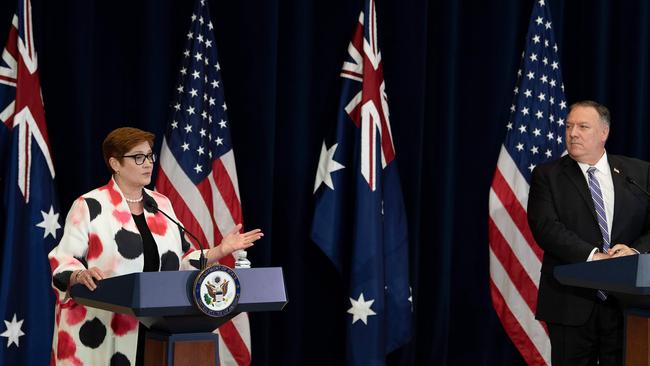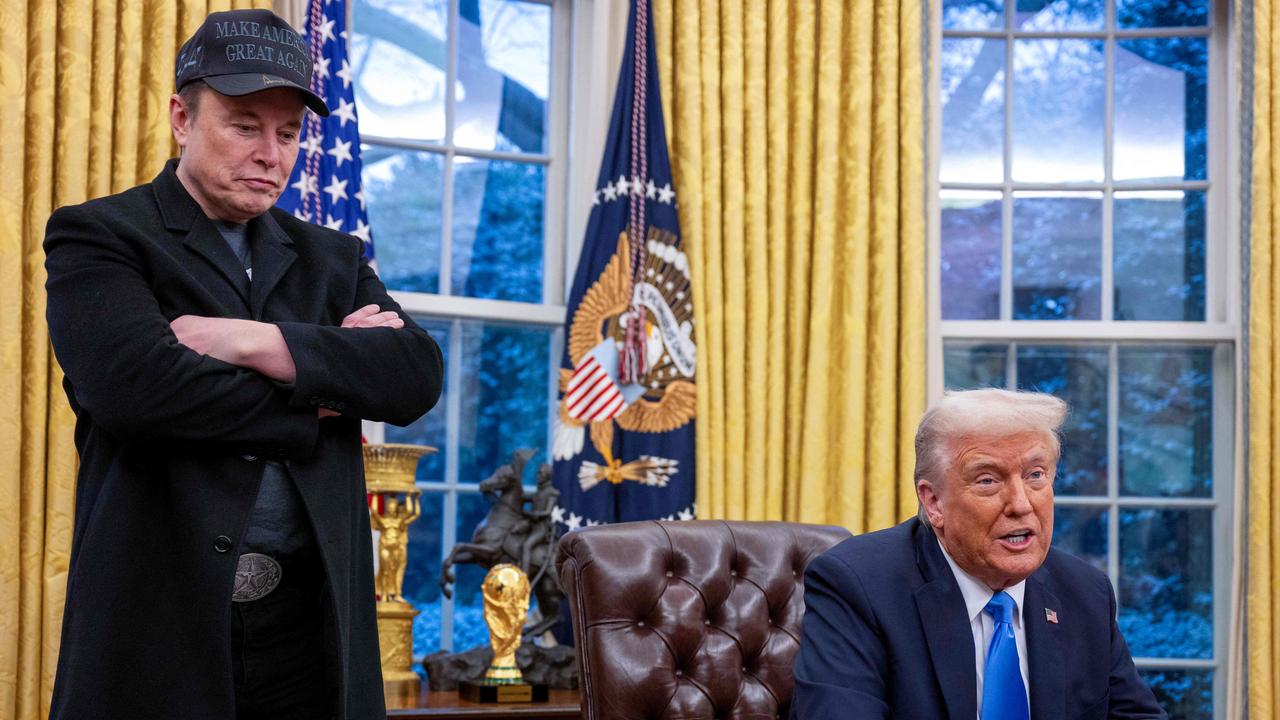
Marise Payne and Linda Reynolds, the Foreign and Defence ministers, have secured a good result from the Australia-US Ministerial meeting in Washington. It was less dramatic than its pre-meeting promotion suggested, but it is no bad thing for these two generally undramatic ministers to engage in a bit of political boosterism for a change.
This AUSMIN produced real results. It also suggests the Morrison government may navigate the complex, demanding 90 days or so until the US presidential election pretty well.
These AUSMIN meetings are very much like a gathering of cardinals in the Catholic Church.
They are highly significant, but generally doctrine doesn’t change, though language can, and often you need a smoke signal to work out just what has gone on. The language is highly specialised, theological, dependent on long doctrinal precedent. Different levels of authority attach to different types of statement. To use the academic term, AUSMIN generates its own “hermeneutic”, a word meaning the doctrinal interpretation of scripture.
This AUSMIN was dominated by China, as has been every AUSMIN for many years except for the first several after the 9/11 terror attacks. Both the US and Australia have recently changed their language about China, but neither has really changed the substance of its policy. Of course, as with the Catholic Church, language sometimes is policy. The new US language was on full but not excessive display. Secretary of State Mike Pompeo talked of the Chinese Communist Party’s “malign activity in the Indo-Pacific”. Defence Secretary Mark Esper said: “Beijing is increasingly resorting to coercion and intimidation.”
A further point on language. Increasing reference to the CCP is not, I think, a throwback to the Cold War but a sign the Americans are trying to make it clear that criticism of the Chinese government is not criticism of the Chinese people. The word Chinese can refer to an ethnicity or a national government. Making the linguistic distinction where you can is worthwhile.
Payne did not use language similar to that of Pompeo and Esper. Not only that, she went out of her way to point out that she was not using US-style language, and that Canberra took the decisions it did about Beijing because of the facts and our national interests, not because of US direction, much less pressure.
A good case in point is freedom of navigation exercises. The US would like us to join with them in sailing within 12 nautical miles of islands Beijing has occupied or created, to demonstrate we don’t accept China’s preposterous sovereignty claims, and to support the critically important principle of freedom of navigation.
The Australian position here is quite complicated and has a clear, longstanding, though nuanced, theology around it. Canberra has not undertaken a FONOP within the 12 nautical mile zone, nor is it likely to. However, it supports the US doing so. And Australian ships in practice, though we don’t spell this out, frequently go right up the 12 nautical mile limit. Moreover we have never decided that we will never do a FONOP. On this, we never say never. Declaring that we had decided never to do one would be a free gift for Beijing.
The kind of FONOP we might do, if we are ever so inclined, is limited. We don’t recognise Beijing’s ridiculous claims to sovereignty over South China Sea islands. But the islands must belong to somebody. Therefore, there’s a respectable case for not sailing within the 12 nautical mile zone. The US asserts the right of safe passage even through such zones.
However, Beijing has also built several artificial islands within the South China Sea. It is abundantly clear in international law that such features cannot generate territorial rights of any kind. Therefore sailing through those 12 nautical mile zones cannot conceivably breach anyone’s rights. If we did a FONOP, that would be the sort we’d do.
Canberra’s recent note to the UN declaring our position that Beijing’s actions there are unlawful was also a change in language and declarative oomph, but not in substance. It followed notes by Vietnam and Malaysia and Beijing itself. In this note we don’t say that Beijing’s claim on this or that island is necessarily wrong but that its claim of a whole vast area of sea, established by drawing lines between all the islands it has occupied or created, is certainly wrong. Moreover, the Permanent Court of Arbitration in 2016 made this abundantly clear.
In making this statement we were supporting the Southeast Asians more than the Americans. Nonetheless, the fact we decided to submit the note was itself significant. As with a cardinals’ meeting, doctrine doesn’t change but their eminences’ emphasis changes.
On China, we are also acting more collegially, ever more in concert with others, with the Americans and the Southeast Asians on the South China Sea, and with all our Five Eyes partners in suspending our extradition treaty with Hong Kong. Beijing doesn’t like dealing with groups of nations. As we align ourselves with those notable militaristic hegemons (irony alert), Canada and New Zealand, we make it harder for Beijing to depict us as reckless outliers.
The general language of the AUSMIN joint statement was non-inflammatory but acutely annoying to Beijing. AUSMIN rebuked Beijing over Hong Kong and its treatment of Uighurs. It also gave strong political support to Taiwan.
On defence co-operation we continued to move the US relationship along. The US has decided to establish a strategic fuel reserve in Darwin. That underlines their commitment to a presence there. US marines on rotation in Darwin are part of a long US effort to disperse, and therefore make it harder to strike, their military assets in our region. But being in Darwin is also a US commitment to Australian security. Canberra and Washington will involve other nations in joint exercises and training in northern Australia.
There was strong support for the Quadrilateral Dialogue involving Japan and India. There is also substantial new commitment to greater, more frequent and more complex joint exercises with the US in our region, in the South China Sea and elsewhere. This further entrenches the US in our region, and deepens their involvement with us.
The Morrison government has secured concrete actions from the Americans that will almost certainly survive the presidential election, no matter who wins. So Canberra takes full advantage of this partly election-induced forward leaning moment in Washington while still maintaining a safe social distancing, so to speak, from any potentially infectious US electoral rhetoric.
That’s a good week’s work.



